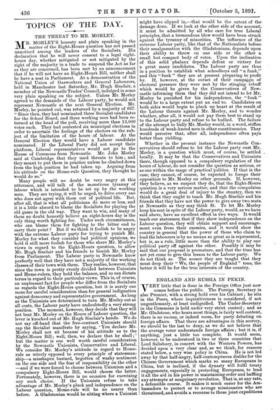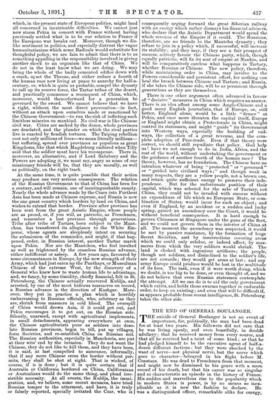ENGLAND AND RUSSIA IN PEKIN.
-VERY little that is done in the Foreign Office just now comes before the public. The Foreign Secretary is also Premier, with a strong hold over his Cabinet ; he sits in the Peers, where inquisitiveness is considered, if not ungentlemanly, at least undignified. The Under-Secretary in the Commons is held under very strict control ; and as Mr. Gladstone, who hears most things, is fairly well content, there is no excuse, or indeed room, for party debating on foreign affairs. That there are advantages in this secrecy, we should be the last to deny, as we do not believe that the average voter understands foreign affairs ; but it is, if anything, just a little too complete. It would seem, however, to be understood in two or three countries that Lord Salisbury, in concert with the Western Powers, has decided upon a very clear and, as we think, for reasons stated below, a very wise policy in China. He is not led away by that .half-angry, half-contemptuous dislike for the Chinese Government which marks so many Europeans in China, but is inclined, if the dynasty will fulfil treaty engagements, especially in protecting Europeans, to lend it all the aid in his power in maintaining order and baffling any attempts at sanguinary revolution. That is, at any rate, a defensible course. It makes it much easier for the Am- bassadors to protect or to avenge missionaries who are threatened, and avoids a recourse to those joint expeditions which, in the present state of European politics, might land all concerned in inextricable difficulties. We cannot just now storm Pekin in concert with France without having previously settled what is to be our relation to France if the European war breaks out. Moreover, though we dis- like sentiment in politics, and especially distrust the vague humanitarianism which some Radicals would substitute for thoughtful policy, we are fain to admit that there is to us something appalling in the responsibility involved in giving another shock to an organism like that of China. We do not in the least know what we are doing. We may bring the whole of the badly cemented edifice down with a crash, upset the Throne, and either reduce a fourth of the human race now living at peace to anarchy for half-a- century, or, which is quite as probable, compel the dynasty to call up its reserve force, the Tartar tribes of the desert, and practically commence a reconquest of China, which, moreover, would thenceforward for a generation be governed by the sword. We cannot believe that we have a right, without the most direct provocation—in fact, without an attack upon ourselves made or sanctioned by the Chinese Government—to run the risk of inflicting such limitless miseries on mankind. No civil war is like Chinese civil war. Cities are sacked by the dozen, whole provinces are desolated, and the plunder on which the rival parties live is exacted by fiendish tortures. The Taiping rebellion cost not only millions of lives—we mean literally millions— but suffering, spread over provinces as populous as great Kingdoms, like that which Magdeburg endured when Tilly said that the soldier must have his recompense. There is, moreover, an alternative, and if Lord Salisbury and the Powers are adopting it, we must say, angry as some of our missionary friends will be, that they are morally, as well as politically, on the right track.
At the same time, it is quite possible that their action may produce one very serious consequence. The relation of the Russian Government to that of China has been for a century, and will remain, one of inextinguishable enmity. Nearly the whole advance made by the Czars into Furthest Asia has been made at Chinese expense, and Russia is now the one great country which borders by land on China, and wishes to extend that border. Province after province has been rent from the great Asiatic Empire, whose people are as proud, or, if you will, as patriotic, as Frenchmen, and remember a lost province through generations. Tribe after tribe of Tartars, born subject to the Mant- chus, has transferred its allegiance to the White Em- peror, whose agents are sleeplessly intent on securing the submission of the remainder, and might, if that hap- pened, order, in Russian interest, another Tartar march upon Pekin. Nor are the Mantchus, who feel insulted as well as frightened by the ceaseless Russian advance, either indifferent or asleep. A few years ago, favoured by some circumstances in Europe, by the new strength of their Army, which had just eaten up the Panthays, or Mussulman Chinese of the extreme West, by the discovery of a General who knew how to waste human life to advantage, and, we fancy, by some timidity, chiefly financial, felt in St. Petersburg, the Chinese actually recovered Kuldja, and arrested, by one of the most hideous massacres on record, a Russian advance in the direction of Hashgar. More- over, they put in practice a plan which is horribly embarrassing to Russian officials, who, arbitrary as they are, shrink from massacre in cold blood. The overspill of China would drown Asia, if it could get out, and Pekin encourages it to get out, on the Russian side. Silently, unarmed, except with agricultural implements, in small detachments, appearing everywhere at once, the Chinese agriculturists pour as settlers into deso- late Russian provinces, begin to till, put up villages, form Societies, and re-establish China on Russian soil.
The Russian authorities, especially in Manchuria, are put at their wits' end by the invasion. They do not want the Chinese, they do not like to kill them, and they have been, it is said, at last compelled to announce, informally, that if any more Chinese cross the border without per- mits, they shall be shot at sight. That is wicked, of course, if it is done ; but it is quite certain that if Australia or California bordered on China, Californians or Australians would do the same thing, and plead irre- sistible necessity. At all events, the Kuldja, the immi- gration, and, we believe, some recent menaces, have tried Russian temper to the uttermost, and have, it is truly or falsely reported, specially irritated the Czar, who is consequently urging forward the great Siberian railway with an energy which rather dismays his financial advisers, who declare that the Asiatic Department would spend the whole revenue of the Empire if it could. The Russians, therefore, are no friends to the Mantchu dynasty ; they refuse to join in a policy which, if successful, will increase its stability ; and they may, if they see a fair prospect of success, actively favour the Chinese party, which, though equally patriotic, will fix its seat of empire at Nankin, and will be comparatively careless what happens in Tartary, whether Russian or Chinese. The new policy, therefore, while maintaining order in China, may involve to the Powers considerable and persistent effort, for nothing can heal the breach between Chinese and Tartars ; and Russia, if she takes the Chinese side, will be as persistent through generations as they are themselves.
There is one other argument often advanced in favour of " decisive " measures in China which requires an answer. There is an idea afloat among some Anglo-Chinese and a good many English journalists, that if Europe, or, still better, England alone, would be a little " firmer " at Pekin, and once more threaten the capital itself, Europe or England might obtain a Protectorate in China, might control its statesmen, and might " guide " its Government into Western ways, especially the building of rail- ways, the collection of a great revenue, and the com- plete adoption of Free-trade. Even if that theory were correct, we should still repudiate that policy. God help us ! have we not enough to do in India, Africa, and the rest of the world, without undertaking the government or the guidance of another fourth of the human race ? The theory, however, has no foundation. The Chinese have no intention whatever of being " protected " or " governed " or "guided into civilised ways ;" and though weak in many respects, they are a yellow people, not a brown one, and retain quite sufficient energy to preserve their inde- pendence. But for the unfortunate position of their capital, which was selected for the sake of Tartary, not China, they could not be invaded with success without an expenditure of life which no European State, or com- bination of States, would incur for such an object; and even if England, by an accident or a sudden and lucky spring, gained an ascendency over the Court, it would be without beneficial consequence. It is hard enough to govern Chinamen at Singapore under the guns of the fleet, and we could not govern them in the interior of China at all. The moment the ascendency was suspected, it would be met by passive resistance, by the formation of huge Secret Societies, and by insurrections covering areas which we could only subdue, or indeed affect, by mas- sacres from which the very soldiers would shrink. The land is choked with ingenious artificers ; the people, though not soldiers, and disinclined to the soldier's life, are not cowards ; they would get arms at last ; and any army Europe could produce would be lost in the multitude of its foes. The task, even if it were worth doing, which we doubt, is too big to be done, or even thought of, and we do not believe that even Russian statesmen contemplate the attempt. All we can do is to aid the only government which exists, and holds those swarms together in endurable order, to keep on existing ; and even that will be difficult if, as appears probable from recent intelligence, St. Petersburg takes the other side.



































 Previous page
Previous page